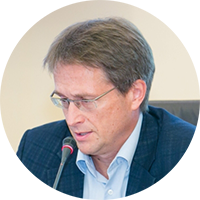HSE Awards Best Teachers of 2016

The Higher School of Economics has selected its Best Teachers of 2016. This year the voting process was different from previous years’, and First Vice Rector Vadim Radaev explains how.
 Vadim Radaev
Vadim Radaev
This year the competition for the best teacher of the year award was very different from previous years’. We had set ourselves four goals: make the voting procedure easier, and faster, get more students and alumni to vote, make the organizational side easier, and improve the selection criteria. We are happy to report back that we were successful on all these points. Finally the competition for best teacher of the year was held university-wide. If previous years contests took place only in Moscow and St. Petersburg, then this year we were also able to include Perm and Nizhny Novgorod. These branches displayed a particularly high turnout: across faculties over 60% of students voted (the figure was as high as 89% for the Humanities Faculty in Nizhny Novgorod). Moscow saw record turnout of 76%, compared to previous highs of just 49%. An impressive 90% of students in the Computer Sciences and Mathematics Faculties voted.
This increase is in large part due to the modernization initiative that brought the election online, linked to the LMS ‘Rate Your Course’ module. Students could cast their vote from any location at any time over a three-week period. Gone are the old days of having to trek into the University to vote on a particular day and put your voting paper into the ballot box, or cast your vote from the computer room.
In order to make it a more user-friendly process, and to save time, we brought two procedures together: you could vote immediately after completing the compulsory module to rate your teacher and course. And although voting was not mandatory, I am glad to say that so many students thought it was not a waste of time, and instead took it seriously. A total of 470 people on the Moscow campus received the minimum number of votes to be considered.
There were three categories of winner: the first, and most numerous – those selected through student votes; the second – academic supervisors selected via the contest for academic research work, and the third – teachers selected by alumni who graduated last year.
We also defined the selection criteria more strictly – winners had to receive no less than the minimum number of votes by students in any one course (e.g. 1st year BA Political Sciences), while also having to exceed the university-wide threshold for votes cast. These parameters were set to ensure that the teaching bonus can be applied and to ensure that the best teachers receive the bonus, whether they work full time (bonus of 30,000 roubles), are tenured but work part-time (15,000 roubles), or part-time teachers (bonus 15,000 roubles).
As is traditional, teachers are given paper letters of appreciation, which we do not yet want to digitize, and this year teachers received 132 letters. This year we placed the boxes for these letters in the hallways to make them more noticeable. Teaching staff will undoubtedly welcome these letters from their students – perhaps as much as winning this contest.
So let us take this opportunity to congratulate all the winners!
You can see the full results here.
See also:
HSE’s Best Teacher Results Announced
The Best Teachers 2017 competition at HSE recently reached its completion. Although the overall procedure this year was the same as it was in 2016, the financial terms changed – the bonuses for the winners have been increased. Vadim Radaev, First Vice Rector of HSE, told us about the vote and some of the perks for all of the winners.
HSE Best Teachers Election Starts
From May 29 to June 18 students can vote for HSE’s best teachers of the academic year. This year there is no need to come to the university to vote. Students can submit their scores online via LMS.
The Votes Are in for HSE's Best Teachers of 2015
Students and alumni of the Higher School of Economics in Moscow and St. Petersburg have determined the Best Teachers of 2015. HSE First Vice Rector Vadim Radaev discusses the results of the voting.
378
people were voted by students as HSE's best teachers in Moscow. Of these instructors, 273 work at the HSE full time, while the other 105 are part-time employees.
‘The More You Give, the More You Get’
Anita Soboleva, Associate Professor at the HSE Faculty of Law Department of the Theory of Law and Comparative Law, has been voted one of the best HSE teachers by students in 2012.
‘Each Student Studies on His Own, and the Teacher Is Only the Torch Which Lights His Way through a Dark Forest’
Ella Khabina, Associate Professor at the Faculty of Economics department of Higher Mathematics, was named one of the best HSE teachers conducting seminar classes in 2012, in a vote by students from the Faculty of Economics.
‘University Education Is about Teaching Students to Think Critically, Not about the Transfer of Knowledge’
Before coming to the HSE in 1999, Olga Kuzina, PhD, who is today Professor at the Department of Economic Sociology, had no experience in teaching. But she was chosen by the students as one of the best university lecturers and not for the first time in 2012.
‘Our University Gives Its Students the Ability to Fight under Any Circumstances’
Students of the HSE Faculty of Management voted Ekaterina Ivanova, Associate Professor at the Department of Entrepreneurial Law, as one of the best lecturers and teachers conducting seminar classes in 2012. In an interview with Matvey Karmakov, HSE student, she told us about a ‘toolkit’ for every lawyer and other cases from her practice.
‘Your Teaching Style Does Matter’
Danil Feodorovykh, a teacher in HSE’s Subdepartment of Microeconomic Analysis, has been elected by the students as one of the best seminar teachers of 2012 at HSE. He spoke to Andrei Scherbakov of the HSE news portal about teaching style and microeconomics.
‘I Teach a Very Interesting Subject’
Sergey Pekarsky, Professor at the Faculty of Economics Subdepartment of Macroeconomic Analysis, first came to the HSE to get a second higher education, since he did not know where to apply his knowledge of applied mathematics. Fifteen years later, he is about to head the HSE’s Department of Theoretical Economics, and students have voted him one of the best teachers at the HSE.


